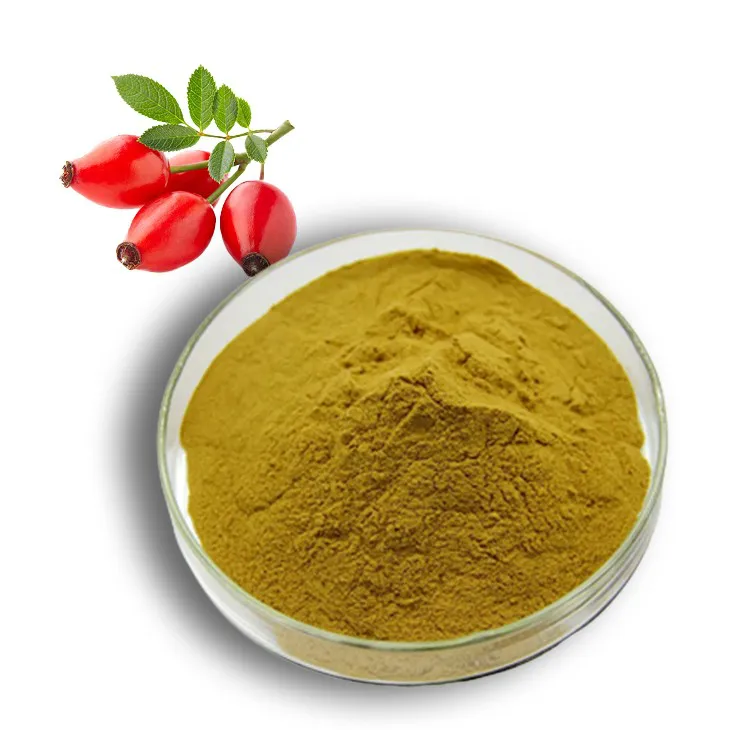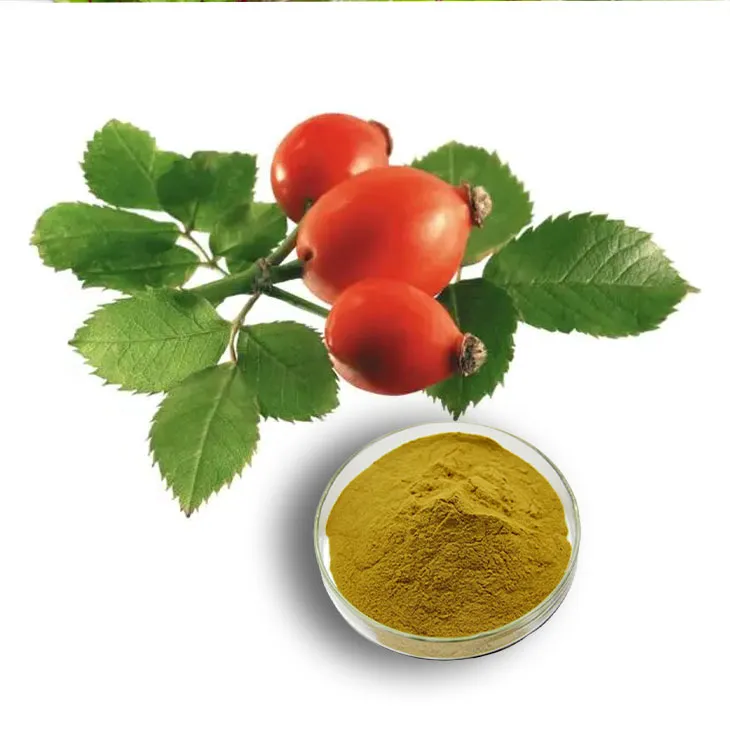- 0086-571-85302990
- sales@greenskybio.com
Use rose hip extract to prevent diseases and enhance immunity.
2024-11-11

Introduction
Rosehip extract has been steadily emerging as a natural supplement with remarkable potential in the realms of disease prevention and immunity enhancement. In recent years, there has been a growing interest in natural remedies and plant - based extracts, and rosehip extract stands out among them. Native to various regions around the world, roses are not only known for their beauty but also for the health - promoting properties of their hips, which are the fruit of the rose plant.

The Composition of Rose Hip Extract
Vitamins: Rosehip extract is rich in a variety of vitamins. Vitamin C is one of the most prominent components. It is well - known for its antioxidant properties and its role in collagen synthesis, which is essential for healthy skin, blood vessels, and connective tissues. In addition to vitamin C, rosehip extract also contains vitamins such as vitamin A, vitamin E, and some of the B - complex vitamins. Vitamin A is crucial for vision, immune function, and cell growth. Vitamin E is another powerful antioxidant that helps protect cells from oxidative damage.
Antioxidants: The antioxidant content in rosehip extract is diverse. Besides vitamin C and E, it contains flavonoids, phenolic acids, and carotenoids. Flavonoids such as Quercetin and kaempferol have been shown to have anti - inflammatory, antioxidant, and anti - microbial properties. Phenolic acids, like caffeic acid and ferulic acid, also contribute to the antioxidant capacity of the extract by scavenging free radicals. Carotenoids, such as beta - carotene, not only act as antioxidants but can also be converted into vitamin A in the body.
Other Bioactive Compounds: Rosehip extract also contains essential fatty acids, such as omega - 3 and omega - 6 fatty acids. These fatty acids are important for maintaining healthy cell membranes and have been associated with anti - inflammatory effects. Additionally, it contains tannins, which have astringent properties and may play a role in digestive health.

How Rose Hip Extract Enhances Immunity
Stimulation of the Immune System: The immune system is a complex network of cells, tissues, and organs that defends the body against pathogens. Rosehip extract can stimulate the activity of immune cells such as lymphocytes, macrophages, and natural killer cells. Lymphocytes are responsible for specific immune responses, including the production of antibodies. Macrophages are phagocytic cells that engulf and destroy foreign invaders, while natural killer cells can directly kill virus - infected cells and tumor cells.
Antioxidant Defense Against Oxidative Stress: Oxidative stress occurs when there is an imbalance between the production of free radicals and the body's ability to neutralize them. This can lead to damage to cells and tissues, which in turn can weaken the immune system. The antioxidants in rosehip extract help to counteract oxidative stress by scavenging free radicals. By reducing oxidative stress, the immune system can function more effectively, as immune cells are less likely to be damaged.
Anti - Inflammatory Effects: Chronic inflammation can suppress the immune system and is associated with many diseases. The anti - inflammatory compounds in rosehip extract, such as flavonoids and phenolic acids, can help to reduce inflammation. By reducing inflammation, the immune system can be better able to respond to pathogens and maintain its normal function.

Role in Preventing Diseases
Cold and Flu Prevention
The high vitamin C content in rosehip extract is beneficial for preventing colds and the flu. Vitamin C is known to boost the immune system, and regular consumption of rosehip extract may increase the body's resistance to viral infections. Additionally, the anti - inflammatory properties of the extract may help to reduce the severity and duration of cold and flu symptoms if an infection does occur.
Cardiovascular Disease Prevention
The antioxidants in rosehip extract can help protect the cardiovascular system. Oxidative damage to blood vessels is a major factor in the development of cardiovascular diseases. By scavenging free radicals, the antioxidants in the extract can prevent the oxidation of low - density lipoprotein (LDL) cholesterol, which is a key step in the formation of atherosclerotic plaques. The essential fatty acids in rosehip extract may also help to reduce inflammation in the blood vessels, further protecting the cardiovascular system.
Cancer Prevention
While it is not a substitute for medical treatment, rosehip extract may play a role in cancer prevention. The antioxidants in the extract can help protect cells from DNA damage caused by free radicals, which is a precursor to cancer development. Additionally, some of the bioactive compounds in rosehip extract, such as flavonoids, have been shown to have anti - cancer properties in laboratory studies, although more research is needed to confirm their effectiveness in humans.
Joint and Bone Health
The vitamin C in rosehip extract is important for collagen synthesis, which is essential for healthy joints and bones. Additionally, the anti - inflammatory properties of the extract may be beneficial for people with arthritis or other joint conditions. Some studies have suggested that rosehip extract may help to reduce joint pain and improve joint mobility in patients with osteoarthritis.
How to Incorporate Rose Hip Extract into Your Diet
Rose Hip Tea: One of the simplest ways to consume rosehip extract is in the form of tea. You can make rosehip tea by steeping dried rosehips in hot water for about 10 - 15 minutes. You can add honey or lemon for taste. Rosehip tea is a delicious and healthy beverage that can be enjoyed throughout the day.
Supplements: Rosehip extract is also available in supplement form, such as capsules or tablets. When choosing a supplement, it is important to look for a high - quality product from a reputable manufacturer. Follow the recommended dosage instructions on the product label.
Rose Hip - Infused Foods: Rosehip extract can be used to infuse foods such as jams, jellies, and syrups. These products can be spread on toast or used as a sweetener in cooking and baking. However, it should be noted that the processing of these foods may reduce the potency of some of the bioactive compounds in the rosehip extract.
Precautions and Considerations
Allergic Reactions: Some people may be allergic to rosehip extract. Symptoms of an allergic reaction may include skin rashes, itching, swelling, or difficulty breathing. If you have a known allergy to roses or other plants in the Rosaceae family, it is best to avoid rosehip extract.
Drug Interactions: Rosehip extract may interact with certain medications. For example, it may interact with blood - thinning medications such as warfarin. If you are taking any medications, it is important to consult your doctor before starting to take rosehip extract.
Pregnancy and Breastfeeding: There is limited research on the safety of rosehip extract during pregnancy and breastfeeding. It is advisable to err on the side of caution and avoid using rosehip extract during these periods without first consulting a healthcare provider.
Conclusion
Rosehip extract has shown great potential in preventing diseases and enhancing immunity. Its rich composition of vitamins, antioxidants, and other bioactive compounds work together to support the body's defense mechanisms. However, more research is still needed to fully understand its mechanisms of action and to determine the optimal dosage and long - term safety. With proper precautions, incorporating rosehip extract into your diet or supplement routine may be a beneficial addition for maintaining good health.
FAQ:
What are the main components in rose hip extract that are beneficial for preventing diseases?
Rose hip extract contains a rich composition of vitamins such as vitamin C, and antioxidants like flavonoids and phenolic compounds. Vitamin C is well - known for its role in immune function and antioxidant protection. The antioxidants help in neutralizing free radicals, which can otherwise damage cells and contribute to the development of diseases.
How does rose hip extract enhance the immune system?
The bioactive compounds in rose hip extract play multiple roles in enhancing the immune system. Vitamin C stimulates the production and function of white blood cells, which are crucial for fighting off infections. Antioxidants protect immune cells from oxidative stress, allowing them to function optimally. Additionally, other components may have a modulating effect on the immune response, ensuring a balanced and effective defense against pathogens.
Can rose hip extract prevent specific diseases?
There is evidence suggesting that rose hip extract may have a preventive effect on certain diseases. For example, its antioxidant properties may help in preventing cardiovascular diseases by reducing oxidative damage to blood vessels. It may also play a role in preventing some inflammatory - related diseases due to its anti - inflammatory components. However, more research is needed to fully establish its preventive effects on specific diseases.
Is it safe to use rose hip extract for disease prevention?
In general, when used appropriately, rose hip extract is considered safe for most people. However, some individuals may be allergic to it. Also, high doses may cause some side effects such as gastrointestinal discomfort. It is always advisable to consult a healthcare provider before starting to use rose hip extract for disease prevention, especially for those with pre - existing medical conditions or taking other medications.
How should rose hip extract be consumed for optimal health benefits?
Rose hip extract can be consumed in various forms such as capsules, tinctures, or as an ingredient in teas or supplements. The appropriate dosage may vary depending on factors such as age, health status, and the specific product. It is important to follow the recommended dosage instructions provided by the manufacturer or as advised by a healthcare professional.
Related literature
- The Health Benefits of Rose Hip Extract: A Review of the Evidence"
- "Rose Hip Extract: Composition, Properties and Potential in Preventive Medicine"
- "Antioxidant and Immune - Enhancing Effects of Rose Hip Extract"
- ▶ Hesperidin
- ▶ Citrus Bioflavonoids
- ▶ Plant Extract
- ▶ lycopene
- ▶ Diosmin
- ▶ Grape seed extract
- ▶ Sea buckthorn Juice Powder
- ▶ Fruit Juice Powder
- ▶ Hops Extract
- ▶ Artichoke Extract
- ▶ Mushroom extract
- ▶ Astaxanthin
- ▶ Green Tea Extract
- ▶ Curcumin
- ▶ Horse Chestnut Extract
- ▶ Other Product
- ▶ Boswellia Serrata Extract
- ▶ Resveratrol
- ▶ Marigold Extract
- ▶ Grape Leaf Extract
- ▶ New Product
- ▶ Aminolevulinic acid
- ▶ Cranberry Extract
- ▶ Red Yeast Rice
- ▶ Red Wine Extract
-
Longan Extract
2024-11-11
-
Lemon Juice Powder
2024-11-11
-
White Willow Bark Extract
2024-11-11
-
Troxerutin
2024-11-11
-
Peppermint Oil
2024-11-11
-
Garcinia Cambogia Extract
2024-11-11
-
Bilberry Extract
2024-11-11
-
Lily extract
2024-11-11
-
Fenugreek Extract Powder
2024-11-11
-
melatonin extract
2024-11-11





















